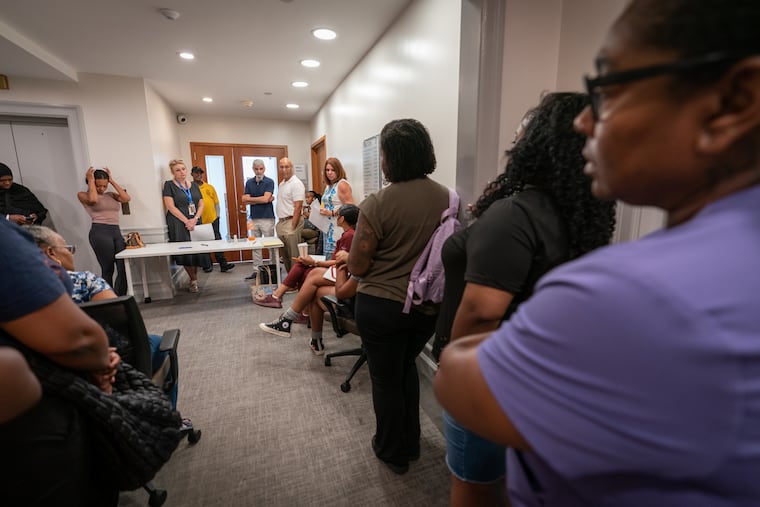Some Philly childcare centers haven’t been paid, endangering their operations, they say. Here’s why.
“It’s really not fair, but under the circumstances, I can’t afford to have my doors open, run electric, feed the children, and maintain without proper checks coming in,” one childcare provider said.

Some Philadelphia childcare centers’ operations are in jeopardy, owners say, after a nonprofit that was supposed to pay them for services already rendered failed to do so.
Many of the providers showed up at the Center City headquarters of Caring People Alliance on Monday, demanding checks — and answers.
Michelle Drummond, owner of Thomas Learning Academy in the city’s Nicetown section, came to CPA’s office because, for the first time in her 12 years in business, she had to shut her center down because she didn’t have the money to operate. So far, she’s been closed for two days because of the lack of payment for the care she provided to children for the entire month of June.
“It’s really not fair, but under the circumstances, I can’t afford to have my doors open, run electric, feed the children, and maintain without proper checks coming in,” said Drummond, who is considering using credit cards or downsizing her already bare-bones staff — she only has three workers, including herself — to make ends meet.
“I’ve got to bite the bullet somewhere,” said Drummond, who said the families she serves are upset and scrambling to find alternative childcare for their children.
Childcare centers typically operate on the narrowest of financial margins.
Most in Philadelphia rely heavily on state subsidies given to low-income families with children, and for years, CPA was the state-designated “early learning resource center” Pennsylvania contracted with to pay all Philadelphia childcare providers on its behalf. The providers submitted invoices to CPA for services provided the previous month.
A representative from CPA said the organization, which also operates Boys and Girls Clubs and older adult programs in Philadelphia, laid off 123 workers from its early learning resource center. After five years of managing the state subsidy program for Philadelphia centers, CPA was notified in October that it had lost the work as of June 30 and that the Public Health Management Corp. would take over going forward.
“This week isn’t easy,” said Caitlin Butrica, a spokesperson for CPA. Employees “have left and gone to the other provider,” she said.
Jerry Macdonald, CPA’s CEO, said in a statement that all Philadelphia childcare providers were told on June 24 that they had to submit June invoices by July 5 in order to be paid on time and were also warned that any invoices sent after July 15 may not be paid.
Macdonald said CPA mailed checks to every provider who had submitted an invoice by July 5. As of Monday, 1,323 checks had cleared the bank, and almost 90% of state funds had been disbursed, he said.
“Rumors that checks have not been honored or returned for insufficient funds are false,” Macdonald said. “The remaining staff is completing the close-out activities required for this grant. We are working diligently to process invoices received after July 5 and before July 15 in the order that they were received. All final payments will be processed as soon as possible on or before the contractually required date of Aug. 20, 2024.”
Ali Fogarty, a spokesperson for the Pennsylvania Department of Human Services, said the office “is aware of the issues some providers are experiencing with payment for care provided in June. We are closely monitoring the situation and working with affected parties to ensure that providers receive the payments to which they are entitled.”
‘This could close my doors’
A number of providers said they still had not been paid as of Monday and were in precarious positions.
Joseph Martin said he might have to shut down his business, Acclaim Academy in Germantown, because of the missed June payment.
Martin recently got a loan to help cover rent and payroll, but can’t make payments because CPA hasn’t paid him. He recently got notice that he’s in violation of his loan agreement, and also owes a contractor $3,000, he said.
”It’s disastrous,” said Martin. “I have accounts that are turning red. The checks are bouncing because I had my payments come out on the day that I’m supposed to get paid.”
Over 14 years in the childcare business, “I’ve never, ever had a missed payment until now,” Martin said, but “this could take me out. This could close my doors.”
Damaris Alvarado-Rodriguez, owner of three Children’s Playhouse early childhood education centers in South Philadelphia and Fairhill, said she and other providers typically got their checks for the previous month’s services on the 19th of every month.
After providers realized they weren’t paid on time, a number of them “raised a stink,” and a few got paid, but most did not, she said.
She submitted her invoices on time but hasn’t seen a check, so she and about 30 other childcare providers showed up at CPA’s offices Monday.
Alvarado-Rodriguez, who’s in the process of opening up a new childcare center, has been able to make her payroll but had to freeze all purchases.
“If someone says, ‘Hey, we need water,’ I have to say, ‘Well, you’re going to have to wait because I have no money,’” said Alvarado-Rodriguez. She also canceled students’ summer trip to the Franklin Institute because she doesn’t have the funds.
The whole situation rankles Alvarado-Rodriguez. Most of the providers are women and people of color, and the industry as a whole is fragile. But at the end of the day, the people who suffer most are vulnerable children, she said.
“It’s not fair to these kids,” said Alvarado-Rodriguez. “These are underprivileged children that rarely get chances to go out and do things, and we’re penalizing them.”